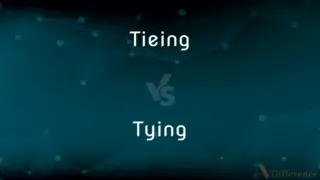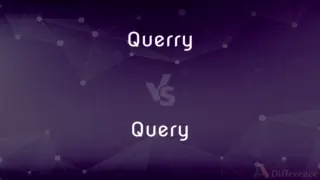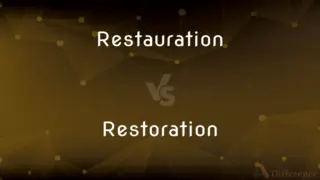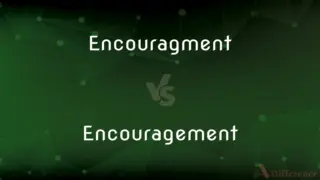Wholey vs. Wholly — Which is Correct Spelling?
Edited by Tayyaba Rehman — By Fiza Rafique — Updated on March 22, 2024
"Wholey" is incorrect; the proper spelling is "Wholly," meaning completely or entirely in every part.
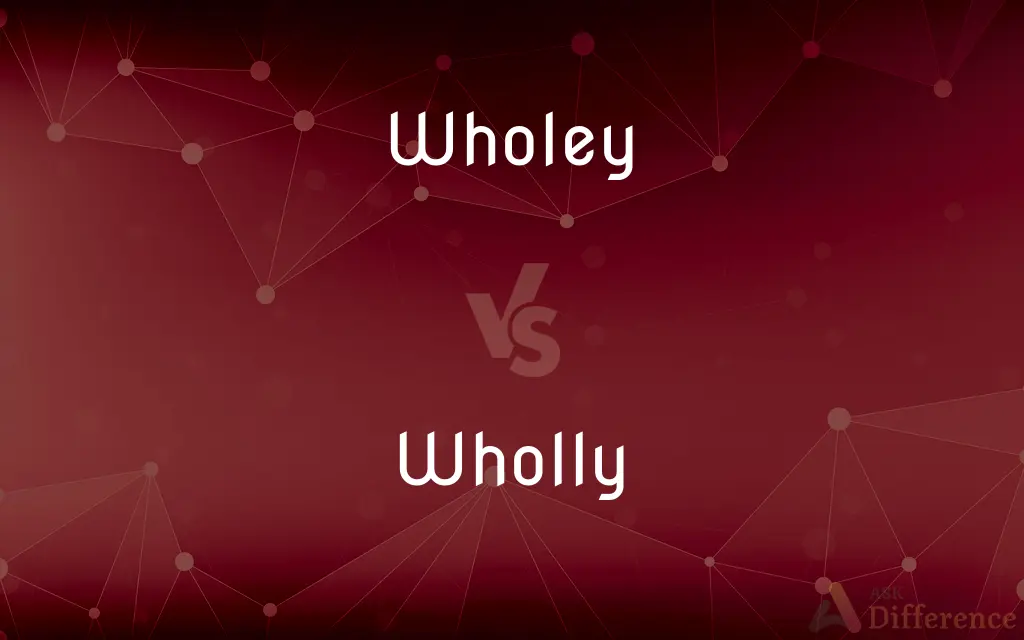
Table of Contents
Which is correct: Wholey or Wholly
How to spell Wholly?

Wholey
Incorrect Spelling

Wholly
Correct Spelling
ADVERTISEMENT
Key Differences
Consider the phrase “wholly whole” to keep the “l” in mind.
Visualize "holy" with a 'w': "Wholly."
Link "Wholly" with "Whole" plus "ly."
Remember "holy" and insert an "l": "Wholly."
The word “whole” contains an "l" as does "wholly."
ADVERTISEMENT
How Do You Spell Wholly Correctly?
Incorrect: The idea was wholey original and innovative.
Correct: The idea was wholly original and innovative.
Incorrect: The project was wholey completed before the deadline.
Correct: The project was wholly completed before the deadline.
Incorrect: She was wholey devoted to her work.
Correct: She was wholly devoted to her work.
Incorrect: The report was based on wholey unfounded assumptions.
Correct: The report was based on wholly unfounded assumptions.
Incorrect: He was wholey unaware of the changes made.
Correct: He was wholly unaware of the changes made.
Wholly Definitions
Completely or fully involved.
The event was wholly delightful.
Entirely; fully.
The statement is not wholly accurate.
Used to express total involvement.
He was wholly to blame.
Reflecting an undivided nature.
The project was wholly her idea.
To a complete degree or to the full or entire extent (`whole' is often used informally for `wholly');
He was wholly convinced
Entirely satisfied with the meal
It was completely different from what we expected
Was completely at fault
A totally new situation
The directions were all wrong
It was not altogether her fault
An altogether new approach
A whole new idea
In an unreserved manner.
She was wholly committed to the cause.
Entirely; fully
The distinction is not wholly clear
She found herself given over wholly to sensation
Completely; entirely
"The old American purposes are still wholly relevant" (John F. Kennedy).
Exclusively; solely.
Completely and entirely; to the fullest extent.
Exclusively and solely.
A creature wholly given to brawls and wine.
In a whole or complete manner; entirely; completely; perfectly.
Nor wholly overcome, nor wholly yield.
To the exclusion of other things; totally; fully.
They employed themselves wholly in domestic life.
Wholly Meaning in a Sentence
He found himself wholly unprepared for the exam.
The film was wholly entertaining from start to finish.
The decision was wholly his to make.
She was wholly absorbed in her painting.
The book was wholly different from anything she had read before.
The project was wholly funded by donations.
Their approach was wholly innovative.
The country was wholly at peace.
The team was wholly focused on winning the game.
His attention was wholly on the task at hand.
She was wholly committed to the cause.
She felt wholly satisfied with her meal.
The garden was wholly organic.
The company was wholly owned by a single family.
The decision was wholly justified.
He was wholly convinced of her innocence.
The victory was wholly unexpected.
He was wholly responsible for the mistake.
The success of the plan was wholly dependent on timing.
Her work was wholly original.
The story was wholly believable.
Their reaction was wholly appropriate given the circumstances.
The audience was wholly captivated by the performance.
They were wholly dedicated to their children's education.
The building was wholly destroyed by the fire.
Wholly Idioms & Phrases
Wholly different
Entirely or completely different.
This approach is wholly different from what we've tried before.
Wholly owned
Completely owned by a single entity.
The subsidiary is wholly owned by the parent company.
Wholly unacceptable
Completely intolerable or not permissible.
The conduct displayed was wholly unacceptable.
Wholly unwarranted
Completely unjustified or without basis.
The criticism was wholly unwarranted.
Wholly absorbed
Completely focused or engrossed in something.
She was wholly absorbed in her study of the texts.
Wholly committed
Entirely dedicated or devoted to a cause or task.
He was wholly committed to improving his skills.
Wholly inadequate
Completely insufficient or not enough.
The measures taken were wholly inadequate to address the issue.
Wholly independent
Entirely self-sufficient and not dependent on others.
She prided herself on being wholly independent.
Wholly involved
Completely engaged or participating in an activity or process.
They were wholly involved in the community project.
Wholly responsible
Entirely accountable for something, without sharing blame.
He accepted that he was wholly responsible for the error.
Wholly supportive
Completely backing or endorsing someone or something.
Her family was wholly supportive of her decision.
Wholly unique
Completely distinctive or having no like or equal.
His style of painting is wholly unique.
Wholly unsuitable
Completely inappropriate or not fitting.
The film is wholly unsuitable for young children.
Wholly justified
Completely warranted or having a solid basis.
The team's celebration was wholly justified after such a hard-fought victory.
Wholly successful
Completely achieving the intended goal.
The event was wholly successful, with a large turnout.
Wholly unprepared
Completely not ready or ill-equipped.
We were wholly unprepared for the sudden change in weather.
Wholly satisfactory
Completely acceptable or sufficient.
The results were wholly satisfactory to all involved.
Wholly unwelcome
Completely not desired or not invited.
The news was wholly unwelcome to the community.
Wholly unexpected
Completely unforeseen or not anticipated.
The outcome of the meeting was wholly unexpected.
Wholly unrelated
Completely disconnected or not having any relation.
The two incidents were found to be wholly unrelated.
Common Curiosities
What is the verb form of Wholly?
No verb form, as "wholly" is an adverb.
What is the pronunciation of Wholly?
/ˈhoʊli/
Why is it called Wholly?
It is derived from “whole” with an "ly" denoting an adverbial form.
What is the root word of Wholly?
Whole.
What is the plural form of Wholly?
Adverbs don't have a plural form.
Which preposition is used with Wholly?
Usage is contextual, but often used without a preposition.
Which conjunction is used with Wholly?
Any can be used based on the context.
Is Wholly a noun or adjective?
Adverb.
What is the singular form of Wholly?
Wholly (no singular/plural differentiation as it's an adverb).
Is Wholly an abstract noun?
No.
Which vowel is used before Wholly?
No specific vowel; usage is contextual.
Is Wholly a collective noun?
No.
Is Wholly a countable noun?
No, it is an adverb.
Is the word “Wholly” a Direct object or an Indirect object?
Neither; it’s an adverb.
Which determiner is used with Wholly?
None, because "wholly" is an adverb.
Which article is used with Wholly?
"Wholly" can be preceded by "is" or "was" but not an article due to its adverbial nature.
How do we divide Wholly into syllables?
Whol-ly.
What is another term for Wholly?
Entirely, fully.
Is Wholly an adverb?
Yes.
Is the word Wholly imperative?
No.
Is the Wholly term a metaphor?
No.
Is the word Wholly a gerund?
No.
How many syllables are in Wholly?
Two.
What is a stressed syllable in Wholly?
Whol.
What part of speech is Wholly?
Adverb.
What is the opposite of Wholly?
Partially.
Is Wholly a negative or positive word?
Neutral.
Is Wholly a vowel or consonant?
It’s a word, not a letter.
How is Wholly used in a sentence?
Example: The approach was wholly ineffective.
Share Your Discovery
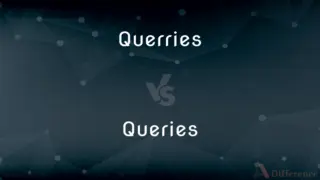
Previous Comparison
Querries vs. Queries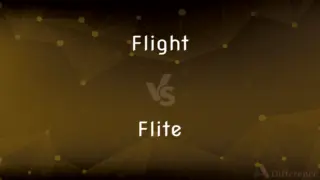
Next Comparison
Flight vs. FliteAuthor Spotlight
Written by
Fiza RafiqueFiza Rafique is a skilled content writer at AskDifference.com, where she meticulously refines and enhances written pieces. Drawing from her vast editorial expertise, Fiza ensures clarity, accuracy, and precision in every article. Passionate about language, she continually seeks to elevate the quality of content for readers worldwide.
Edited by
Tayyaba RehmanTayyaba Rehman is a distinguished writer, currently serving as a primary contributor to askdifference.com. As a researcher in semantics and etymology, Tayyaba's passion for the complexity of languages and their distinctions has found a perfect home on the platform. Tayyaba delves into the intricacies of language, distinguishing between commonly confused words and phrases, thereby providing clarity for readers worldwide.

